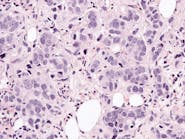A weekly dose of semaglutide 2.4 mg significantly reduced the risk of major adverse cardiovascular events (MACEs) in people with overweight or obesity and cardiovascular disease but not diabetes, regardless of blood sugar level, according to a clinical trial including researchers from UT Southwestern Medical Center.
The findings, published in Diabetes Care, also show the reduction in MACEs – a combination of heart attacks, stroke, or death from cardiovascular causes – isn’t due to the drug’s effect in lowering blood sugar.
Ildiko Lingvay, M.D., M.P.H., M.S.C.S., and her international colleagues collaborated in the Semaglutide Effects on Cardiovascular Outcomes in People with Overweight or Obesity Trial (SELECT). This is one of the longest and largest studies with semaglutide (a drug better known in the U.S. under its brand name Wegovy), designed to test its effects on MACE risk in people who have overweight or obesity with cardiovascular disease but no diabetes.
The main results of the trial, published last year in tumors, showed a 20% reduction in the risk of MACE in 8,803 participants who took semaglutide, compared with 8,801 participants who took an identical-looking placebo.
In the recent analysis, Dr. Lingvay and her colleagues focused on examining whether semaglutide’s glucose-lowering effects might be at least partially responsible for lowering the participants’ MACE risk. To answer this question, they tested the participants’ hemoglobin A1C (HbA1C) – a measure of average glucose over two to three months – at the start of the trial and after the participants had taken semaglutide or the placebo for 20 weeks. At baseline, a third of the participants had HbA1C readings below 5.7%, a level considered normal. However, the remaining two-thirds had readings between 5.7% and 6.5%, in the prediabetes range.
Most people on semaglutide had a significant reduction in their HbA1C levels by the 20-week mark. An analysis of the number of MACEs that occurred during the study period showed those taking the drug had about 20% fewer of these events, regardless of their HbA1C at baseline and subsequent measurements over time. These findings suggest factors other than semaglutide’s glucose-lowering effects are responsible for this reduction in MACE risk, Dr. Lingvay said.
Other recent findings of SELECT to which Dr. Lingvay contributed have shown that weight loss from semaglutide also doesn’t appear connected to the reduction in MACE risk, but a decrease in inflammation from the drug does seem to be partially responsible.
In another analysis of the SELECT study recently published in Nature Medicine, Dr. Lingvay and colleagues reported the effect of once-weekly semaglutide on kidney function. The researchers’ results suggested semaglutide also had a beneficial effect on the kidneys.





